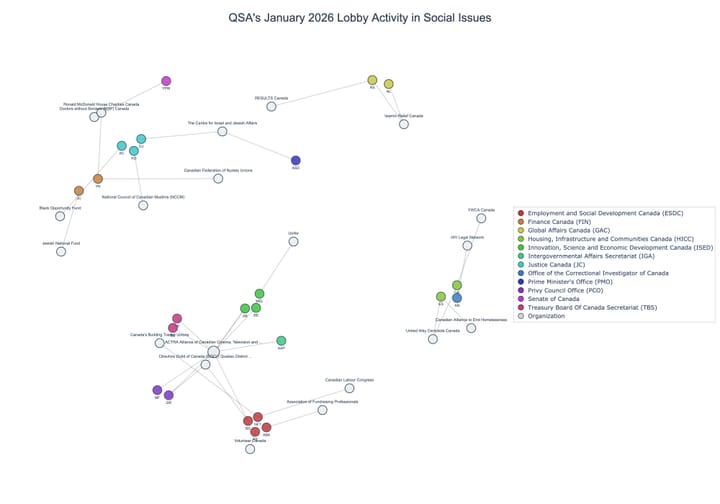QSA's Week in Social Issues (#28, 2025)
Federal child benefit boost announced; chemicals management plans published; Indigenous family support receives funding; new centre of excellence on wildfire resilience; Saskatchewan Drug Treatment Courts expanded; oral health and school food initiatives updated; consumer protection in telecom di...

Good morning! This is Queen Street Analytics' weekly roundup of regulatory developments, legislative discussions, political announcements and other government-related news concerning social advocacy issues. Every Monday, we break down the most important updates in this space in under five minutes.
Want to see GR activities in areas related to Social Issues? Don’t miss this week’s updates in Arts & Culture and Indigenous Affairs.
Dates: 2025-07-13 to 2025-07-19
📋 In This Week's Newsletter
• 🇨🇦 Canadian Federal GR News
• 🗺️ Canadian Provincial GR News
• 💬 Government Consultations
• 📚 What We're Reading This Week
Canadian Federal GR News
Canada Child Benefit Increased for 2025–26
On July 18, 2025, Secretary of State Anna Gainey announced an increase in the Canada Child Benefit (CCB) for the 2025–26 benefit year. Families are now eligible to receive up to $7,997 per child under age 6 and $6,748 per child aged 6 to 17, representing a rise of approximately $200 per child compared to the previous year. The government indicated that these funds are intended to assist families in meeting everyday expenses. In addition, efforts such as the National School Food Program—backed by a $1 billion federal investment—and the Canadian Dental Care Plan are being implemented to improve access to nutrition and oral health care for children. The announcement also referenced ongoing investments in affordable child care, housing, and health care. These developments form part of a broader set of measures aimed at providing greater affordability for Canadian families with children.
Sources: Announcements: www.canada.ca

Implementation Framework for the Right to a Healthy Environment Published
The Department of the Environment and Department of Health published the implementation framework for the right to a healthy environment under the Canadian Environmental Protection Act, 1999, as of July 19, 2025. This framework fulfills a legislative commitment following the royal assent of Bill S-5 in June 2023. The document is available in the Environmental Registry, outlining how this right will be considered in the administration of the Act. The process included a prior public comment period and formal consultations as mandated. This framework provides guidance on integrating environmental rights into regulatory decisions across federal environmental legislation.
Sources: Gazette, Part I: www.gazette.gc.ca
Plan of Priorities for Federal Chemicals Management Released
On July 19, 2025, the Plan of Priorities under the Canadian Environmental Protection Act was released in the Canada Gazette, Part I. The plan identifies upcoming priorities for substance management to protect human health and the environment, in line with changes introduced under Bill S-5. It specifies substances prioritized for assessment, controlling risks, and activities to promote alternatives to vertebrate animal testing in toxicology studies. The plan is subject to periodic review and reprioritization driven by new scientific evidence, international developments, and stakeholder input. The government reaffirmed the goal of balancing predictability with adaptability as chemicals management evolves.
Sources: Gazette, Part I: www.gazette.gc.ca
Canada Invests $2.2 Million to Support Families of Missing and Murdered Indigenous People in Nova Scotia
On July 16, 2025, the federal government announced a $2.2 million investment over five years to enhance support for families of missing and murdered Indigenous people in Nova Scotia. The funds will bolster the Family Information Liaison Unit and expand the Nova Scotia Native Women’s Association's outreach efforts. The province will add a full-time case coordinator for Victim Services, and a new outreach worker will strengthen culturally grounded support. The liaison unit works to gather information from various government systems and provide families with access to Elders and cultural advisors. The announcement was made by MP Jaime Battiste on behalf of the Minister of Justice, highlighting the intent to improve trauma-informed services.
Sources: Announcements: www.canada.ca
Canada Invests in New Centre of Excellence on Wildfire Resilience
On July 18, 2025, an $11.7 million investment was announced to establish the Wildfire Resilience Consortium of Canada (WRCC). The WRCC, funded through the Wildfire Resilient Futures Initiative, will function as a virtual hub to advance innovation and knowledge sharing in wildland fire prevention and response. The consortium will involve domestic and international partners and support Indigenous fire stewardship. The latest wildfire forecasts project above-average temperatures and continued elevated wildfire risk, particularly in the western and northern regions. The WRCC will implement actions from the Kananaskis Wildfire Charter, integrating traditional Indigenous knowledge in its approach.
Sources: Announcements: www.canada.ca
Competition Bureau Recommends Consumer-Friendly Telecom Service Labels
The Competition Bureau participated in CRTC proceedings on June 13, 2025, advocating for the adoption of 'nutrition label' formats to simplify telecommunications service comparisons for Canadian consumers. The Bureau supports clear, standardized disclosures of service cost and performance, suggesting that all mandatory charges be included in a single price to comply with the Competition Act's 'drip pricing' provisions. Panelists also recommended the labels be applied to wireless services and be made widely available, including in contract expiry notices. These recommendations seek to facilitate consumer switching and improve competitive dynamics in the telecommunications marketplace.
Sources: Announcements: www.canada.ca
Parks Canada and Partners Allocate $5 Million for Jasper Wildfire Recovery
Parks Canada and the Canadian Red Cross announced up to $5 million in additional funding on July 16, 2025, for Jasper residents affected by last year's wildfire. The financial support will cover uninsured costs for soil remediation, a prerequisite for rebuilding permanent housing. So far, more than $180 million in federal funds has supported expedited permits, debris removal, and interim housing. The new focus is on long-term health and safe restoration. The Canadian Red Cross will manage the distribution of support, and further details on coordinated soil remediation efforts will be shared with impacted residents soon.
Sources: Announcements: www.canada.ca
Federal Funding Expands Drug Treatment Courts in Saskatchewan
On July 18, 2025, the Department of Justice announced renewed annual funding of up to $850,000 for Saskatchewan's Drug Treatment Courts (DTCs), supporting the Battlefords DTC and expansion beyond Regina and Moose Jaw. This financial support is part of the Justice Canada’s Drug Treatment Court Funding Program, aiming to redirect eligible adult offenders whose crimes are associated with substance use toward treatment rather than custodial penalties. The expansion was announced by MP Buckley Belanger and is positioned as a step to address addiction as a factor in the criminal justice system.
Sources: Announcements: www.canada.ca
Over $3.2 Million Invested for Coastal Flood and Erosion Resilience in Gwa’yas’dums, B.C.
A federal investment exceeding $3.2 million will fund shoreline protection infrastructure upgrades in the Village of Gwa’yas’dums, British Columbia. Announced July 18, 2025, the project includes armouring the shoreline and building a bio-engineered slope to defend against sea-level rise and storm surges. The current infrastructure, dating from the 1960s, is at end-of-life. The upgrades are intended to shield the community's critical infrastructure and ensure the continued delivery of essential services in the face of increasing climate-related risks.
Sources: Announcements: www.canada.ca
Operational Guidelines Issued for Collection of Indigenous and Racialized Identity Data in UCR Survey
Statistics Canada released operational guidelines to assist police in collecting Indigenous and racialized identity information under the Uniform Crime Reporting (UCR) Survey. The guidelines, published July 16, 2025, are intended to standardize national data collection practices and support equity-focused outcomes in public safety. The initiative is expected to inform policy makers, researchers, and community stakeholders relying on equitable and reliable crime statistics.
Sources: Open Government Data Set: www.statcan.gc.ca
New Data Shows Record High Income Inequality in Q1 2025
According to newly released data for Q1 2025, the income gap between the highest and lowest income Canadian households has reached its largest level on record. Higher-earning households reported gains driven by investment income, whereas those with the lowest incomes experienced wage declines. While lower borrowing costs and easing inflation supported some households’ savings and debt management, average wealth for younger and less wealthy households declined due to real estate markets. These findings come from Statistics Canada's latest household economic accounts data.
Sources: Open Government Data Set: www.statcan.gc.ca
Canadian Provincial GR News
B.C. Advances Integration of Social Services, Prioritizes Prevention for Children and Youth
The Government of British Columbia is focusing on integrating social services and adopting a prevention-based approach for children and youth. Updates include new tools for oversight, a larger workforce, and improved support for kinship care providers.
Sources: Provincial Announcement: news.gov.bc.ca
Nova Scotia and Federal Government Renew Support for Families of Missing and Murdered Indigenous Peoples
Nova Scotia and the federal government will provide nearly $2.2 million in additional funding over five years to expand the Family Information Liaison Unit and community outreach services, supporting Indigenous families with culturally grounded resources.
Sources: Provincial Announcement: news.novascotia.ca
Alberta Opens Grant Program to Support Survivors of Gender-Based Violence
Alberta launched the Community Pathways to Justice grant on July 14, providing $1.25 million in one-time funding to help community-based organizations and Indigenous communities enhance access to justice and survivor-centered services for gender-based violence.
Sources: Provincial Announcement: www.alberta.ca
Quebec Reaches Maximum for Family Reunification Applications for Parents and Grandparents
Quebec's immigration ministry has stopped accepting new sponsorship applications for parents, grandparents, and certain relatives until June 25, 2026, after reaching the quota for such applications for the 2024–2026 period.
Sources: Provincial Announcement: www.quebec.ca
Manitoba Invites Nominations for Mosaic Awards Honouring Contributions of Immigrants and Refugees
Manitoba opened nominations for the inaugural Mosaic Awards, which will recognize the contributions of newcomers, immigrants, and refugees during Welcoming Week, September 14–20, 2025.
Sources: Provincial Announcement: news.gov.mb.ca
Government Consultations
CRTC Launches Consultation on Improving the National Public Alerting System
The CRTC started a public consultation on July 15 to gather input on improving Canada’s National Public Alerting System, focusing on alert accessibility, languages reflecting local communities, and national distribution.
Sources: Canadian Government Consultations: crtc.gc.ca
What We're Reading This Week
- Territorial ministers seek full funding for national plan on gender-based violence: Canada's territorial ministers call for federal funding to implement the national gender-based violence strategy.
- Bring ‘Em Up foundation supporting young immigrants and refugees: Community initiative offers support to youth newcomers and refugees.
- Canada’s immigration system, once admired for its fairness and balance, has drifted into crisis: Assessment of strains and challenges in the Canadian immigration system.
- Major projects: How Bill C-5 works and why Indigenous leaders are so concerned: Indigenous leaders express concerns with federal Bill C-5 affecting their communities.
- Let’s focus on the right fix for immigration: Editorial reviews policy proposals on Canadian immigration reforms.
- African asylum seekers in the GTA face systemic barriers and need better supports: new report: Report details barriers faced by African asylum seekers in Greater Toronto.
- Push back against Bill 5 continues to grow in Hamilton area: Community members in Hamilton are voicing opposition to Ontario's Bill 5.
- Cambridge Bay, Nunavut, taking measures to address concerns over drugs, community safety: Community meeting in Cambridge Bay addresses public safety and substance issues.
- Funding gives a boost to community groups in Waterloo region: Waterloo region community organizations receive financial support to continue outreach.
- Non-binary person’s U.S. deportation paused due to risks faced by LGBTQ+ people: Deportation of a non-binary individual paused over concerns about LGBTQ+ safety.

